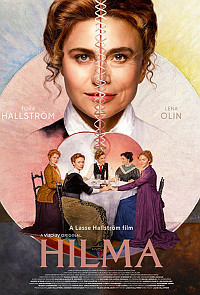| SHADOWS ON THE WALL | REVIEWS | NEWS | FESTIVAL | AWARDS | Q&A | ABOUT | TALKBACK | |||||||||||||||||||||||||||||
 Shadows off the beaten path Shadows off the beaten pathIndies, foreign, docs and shorts...
On this page:
HILMA |
PETER VON KANT |
UTAMA
| |||||||||||||||||||||||||||||
| See also: SHADOWS FILM FESTIVAL | Last update 30.Oct.22 | |||||||||||||||||||||||||||||
|
Hilma Review by Rich Cline | 
Is it streaming?
| 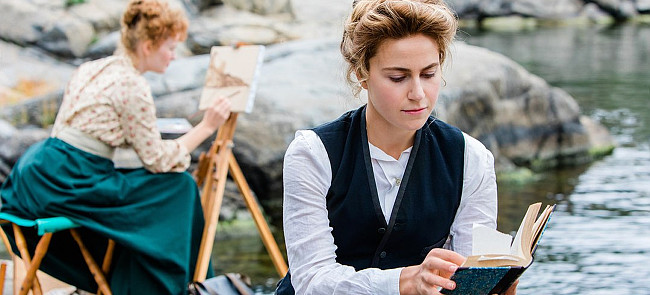 Beautifully written and directed by Swedish master Lasse Hallstrom, this biopic about famed painter Hilma af Klint features luxuriant period design and strongly internalised performances. Instantly engaging on a variety of levels, this is an accessible and often gripping exploration of an offbeat artist on a quest to understand where her talent comes from. So while it's all rather slick and sunny, the film is packed with provocative depths. Crossing 1944 Stockholm, 81-year-old Hilma (Olin) remembers summers 60 years earlier as a teen (then Tora Hallstrom, Lasse's daughter) obsessed with nature and science. Seeing drawing as a tool to map the world, she attends art school, but as a woman has to enter through the back door. There she meets Anna (Chalk), who introduces her to editor Mathilda (Cole), and they form a group of five spiritually inclined artists. In work that blends scientific, political and spiritual themes, Hilma creates striking abstract work that she insists is hidden until 20 years after her death. Feeling this irresistible connection to nature, Hilma seeks to tap into a deeper force in her work, aiming to elevate the thoughts of those who looked at her paintings. She often speaks of creating a "temple" in this sense. Hallstrom captures this idea with clever imagery, strongly reflecting Hilma's point of view, including wild visions and the idea that her abstract paintings were created through her by higher beings. So she hopes her idol, philosopher Rudolf Steiner (Wlaschiha), can explain them to her. She's far ahead of her time, but the art world will catch up. Performances are heightened in period style, matching the lyricism of the filmmaking rather than going for something earthy. Offhanded moments come in the long-term relationship between Hilma and Anna, which is nicely played by Hallstrom and Chalk, even when things get a bit melodramatic. Hilma's other close friend is Thomasine (De Lisser then Holman), nurse to her tough-but-frail mother (Bjork). And because there are no historical records that either of these connections were romantic, the film remains discreet about them. Hilma's journey has continual wrinkles, although it's depicted in a fairly straightforward storytelling style, covering such a huge span of decades that it can only crack the surface now and then. As a director, Hallstrom has a terrific eye for light and colour, and weaves Hilma's art into the fabric of the scenes. And it's fascinating that it takes so long for her to consider that her magnificent, groundbreaking art might be coming from inside her.
|
| Peter von Kant Review by Rich Cline | 
| 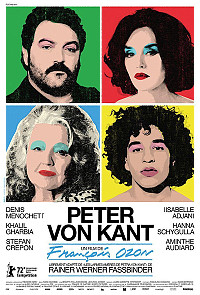 dir-scr-prd Francois Ozon with Denis Menochet, Isabelle Adjani, Khalil Gharbia, Stefan Crepon, Hanna Schygulla, Aminthe Audiard release Fr 6.Jul.22, US 2.Sep.22, UK Oct.22 lff 22/France 1h25 BERLIN FILM FEST  Is it streaming?
| 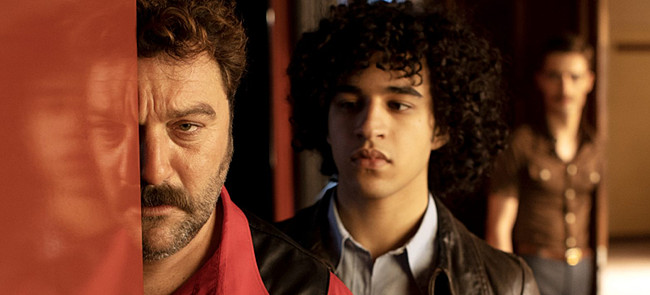 French filmmaker Francois Ozon returns to German maestro Rainer Werner Fassbinder, this time riffing on his 1972 drama The Bitter Tears of Petra von Kant. Genders and more are flipped around, turning this into a loose biopic about Fassbinder himself. With eye-catching style, the film is also entertaining for its visual panache, pitch-black wit and a provocatively lacerating look at the movie industry. Plus a collection of unforgettable characters. In 1972 Cologne, filmmaker Peter (Menochet) lives in a flat that's a shrine to both his career and actress friend Sidonie (Adjani), who drops by for a visit. Ordering his adoring assistant Karl (Crepon) around, the diva-like Peter gets even more animated when Sidonie's hot 23-year-old friend Amir (Gharbia) arrives. Peter decides to make him a star, moving him into his bed. Months later, Amir is a success, and Peter is falling apart. Then on his birthday, Peter's mother (Schygulla), teen daughter (Audiard) and Sidonie drop in to celebrate. And things don't go well. Ozon creates an almost fantastical atmosphere, highlighting the pastiche nature of the script while also creating a vivid sense of a specific time and place. It's clever, and a lot of fun, to see how Peter's apartment decor represents his drama queen tendencies, because he reacts to everything with over-the-top obsessions that are splashed all over the walls. Meanwhile, each of the characters around him has his or her own passions and vulnerabilities, also skilfully reflected in the film's design work. So even if it feels somewhat stage-bound with its single set, this is also wonderfully cinematic. Menochet is terrific in the title role, a triumphantly successful man who is riddled with not-so-secret insecurities. The way he takes these out on those around him is often unnerving to watch, with moments that are tender, pointed and downright cruel. Each of the other actors adds superb textures in their roles, providing powerfully nuanced reactions to Peter's intensity. The standout is Crepon's Karl, whose dryly amusing glares in response to Peter's brusquely shouted instructions ("Karl, go squeeze my oranges!") are hilarious, because he's secretly loving the abuse. Even as the script plays with so many layers of meaning, Ozon continually surprises us with his insights. This film has a lot to say about Fassbinder's notoriously out-of-control lifestyle and artistic expression, and Ozon is also taking a charged look at codependency and manipulation. Additionally, it's a refreshingly honest look at how the movie business works, with filmmakers and actors manipulating each other to get what they want. So of course in the #metoo age, this feels both daring and important.
|
| Utama Review by Rich Cline |  MUST
MUST  SEE SEE
| 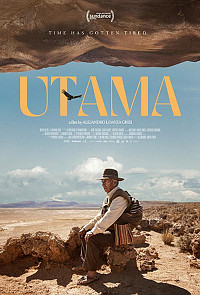 dir-scr Alejandro Loayza Grisi prd Santiago Loayza Grisi, Federico Moreira with Jose Calcina, Luisa Quispe, Santos Choque, Felix Ticona, Rene Perez, Jorge Yucra Nogales, Placide Ali, Francisca Villa, Candelaria Quispe, Rene Calcina, Juan Carlos Calcina release US 4.Nov.22, UK 11.Nov.22 22/Bolivia 1h27 SUNDANCE FILM FEST  Is it streaming?
| 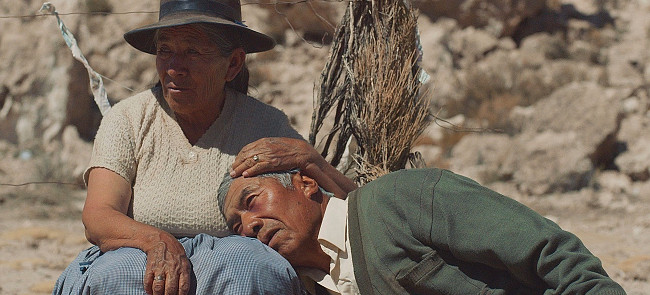 Taking its title from the Quechua word for "our home", this sharply visceral drama is set in Bolivia's highlands, focussing on the details of life for an elderly couple that is grappling with the devastating effects of an extended drought. Writer-director Alejandro Loayza Grisi assembles this in a documentary style, creating a sharp evocation of the local culture. It's a gorgeous slice of life with properly momentous undertones. At their isolated ranch on a now-dusty plane, Virginio (Calcina) tends to a herd of llamas while his wife Sisa (Quispe) has to trek to the nearest village to get water, because their well has just run dry. Virginio is worried that the llamas aren't well, and he's having trouble breathing himself. Then the village well also runs dry, and Sisa struggles with hiking the extra distance to the river. A visit from their city-dwelling 20-something grandson Clever (Choque) offers them some badly needed help. But the stubborn Virginio won't consider migrating like everyone else. Spectacularly photographed by Barbara Alvarez, the film captures the enormous landscapes like an epic Western, then shifts into this couple's warm home, where conversations are underscored with wry humour, their long years together and a growing concern for how difficult things are becoming due to both their age and the lack of rain. Indeed, the desolately dry fields and parched vegetation are as ominous as the vultures circling above. It's as if nature itself is telling them it's time to leave. But the community perseveres. All three central performances have an earthy authenticity, as each takes a journey into the soul. Calcina gives Virginio a wonderfully cranky personality, refusing to speak to Clever in Spanish until he has verified his motive for visiting. He's also hiding his serious illness from Quispe's alert, persistent Sisa, who both loves him and is exasperated by his refusal to face the truth. And Choque's Clever is a likeable outsider, worried about his grandparents but beginning to understand why they might want to stay here. Each moment of this film is immaculately observed. At a town meeting, the locals discuss the necessity of migration, because government promises of help have never materialised. Virginio's entire identity is connected to this place, this land, and he has to look deeply into his soul to work out what he needs to do in this extraordinary situation. And yet there are flickers of hope in the comfort of history and tradition, as well as the promise of a new way of doing things.
| 
See also: SHADOWS FILM FESTIVAL © 2022 by Rich Cline, Shadows
on the Wall
HOME | REVIEWS | NEWS | FESTIVAL | AWARDS
| Q&A | ABOUT | TALKBACK | | ||||||||||||||||||
